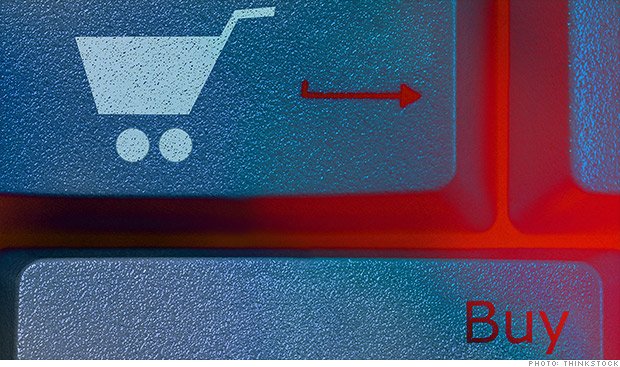
Legislation, which the U.S. Senate is expected to vote on next week, would allow the 45 states with sales taxes (and the District of Columbia) to require large online retailers to collect tax on purchases.
NEW YORK (CNNMoney)
The Senate is expected to vote on legislation next week that would allow the 45 states (and the District of Columbia) that charge sales tax to require online retailers to collect taxes on purchases made by their residents. If approved, the bill will move to the House.
So how would the passage of the "Marketplace Fairness Act" affect your online shopping? A lot depends on where you live. From California to New York, here's a look at what you can expect.
What does the bill propose?
Big brick-and-mortar retailers with an online presence, such as Wal-Mart (WMT, Fortune 500), already charge sales tax for web purchases. But in many states, you can still shop tax-free at Internet-only retailers like Amazon.com (AMZN, Fortune 500) or Overstock.com (OSTK).
Currently, these online sellers are only required to collect tax in states where they have a physical presence, such as a store or warehouse. But under the proposed law, states would be able to require online sellers to collect sales tax if they have sales of at least $1 million in states where they don't have operations.
Is this a new tax?
No. While some opponents of the bill argue that it constitutes a tax increase, in most states you're already supposed to be paying taxes on all online purchases.
Related: Impact of Internet sales tax on online commerce
Most states require you to pay a so-called "use tax" when a sales tax wasn't collected at online checkout. But few people actually do so.
How much more would I have to pay?
In some cases, nothing.
In recent years, some states have passed laws forcing major online retailers to collect sales tax, while others have inked individual agreements directly with Amazon.com to collect taxes on purchases made by residents of certain states.
If you live in Arizona, California, Kansas, Kentucky, New York, North Dakota, Pennsylvania, Texas and Washington -- states where the Internet giant has warehouses -- you are already paying taxes on Amazon purchases. And some states, like New York, have laws that require any online retailer with a so-called in-state "affiliate," such as marketers who link to the retailer's site, to collect taxes on purchases.
If you're a resident of a state that doesn't charge any sales tax, like Montana or New Hampshire, then your online shopping bills would also stay the same.
In many states, however, you will pay more. How much more depends on the rates set by state and local governments. For example, a $1,000 television sent to New Jersey will carry a $70 tax, while a resident of Maine would pay $50 in sales tax on the same purchase.
Will all online retailers be charging a sales tax?
No. Smaller retailers likely won't meet the $1 million threshold for out-of-state sales.
That means the necklace you buy from a budding entrepreneur in another state on Etsy.com or the movie poster you snag in someone's auction on eBay (EBAY, Fortune 500) will likely remain untaxed.
Will all products be taxed?
It all depends on the sales tax laws where you live.
In general, states tax the purchase of so-called "tangible goods," but there are often a laundry list of exceptions. For example, in New Jersey all clothing is tax-free. Meanwhile, clothing items and footwear that cost less than $110 are not taxed in New York.
Related: The true price of "free" online college courses
Want to buy an American flag to hang outside? Some states like Connecticut and Wisconsin won't charge a tax on American or state flags, for that matter.
Prescription medications or grocery products, like milk or raw chicken, are often tax-free but other food products, such as prepared food or junk food, will often get hit.
What about digital music, streaming movies and e-books?
Like other products, the Marketplace Fairness Act wouldn't create any new taxes on so-called "digital goods," but it would let states enforce the laws they have in place already.
Washington state, for example, has a digital goods sales tax that applies to everything from streaming music and movies to e-books. Florida, meanwhile, taxes streaming video but not digital books.
Many sellers already collect these taxes. For example, if you live in Washington, where Amazon.com is based, you're already paying tax on digital purchases. Apple (AAPL, Fortune 500) already collects sales tax for iTunes purchases in states where digital music is taxed, according to its website. And Netflix (NFLX) also already collects tax where applicable.
To find out what items are taxed in your state and at what rate, contact your state's tax and revenue agency. A map with links to the 50 state tax websites can be found here. ![]()
First Published: May 3, 2013: 6:17 AM ET
Anda sedang membaca artikel tentang
What an Internet sales tax will cost you
Dengan url
http://ngopingeteh.blogspot.com/2013/05/what-internet-sales-tax-will-cost-you.html
Anda boleh menyebar luaskannya atau mengcopy paste-nya
What an Internet sales tax will cost you
namun jangan lupa untuk meletakkan link
What an Internet sales tax will cost you
sebagai sumbernya
0 komentar:
Posting Komentar